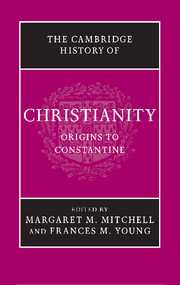Book contents
- Frontmatter
- Prelude: Jesus Christ, foundation of Christianity
- Part I The Political, Social and Religious Setting
- Part II The Jesus Movements
- Part III Community Traditions and Self-Definition
- Part IV Regional Varieties of Christianity in the First Three Centuries
- Part V The Shaping of Christian Theology
- Part VI ‘Aliens’ become Citizens: towards Imperial Patronage
- 28 Persecutions: genesis and legacy
- 29 Church and state up to c.300 ce
- 30 Constantine and the ‘peace of the church’
- 31 The first Council of Nicaea
- 32 Towards a Christian material culture
- Conclusion: retrospect and prospect
- Bibliographies
- Index
- Map 1. The Roman Empire in the time of Marcus Aurelius
- References
31 - The first Council of Nicaea
from Part VI - ‘Aliens’ become Citizens: towards Imperial Patronage
Published online by Cambridge University Press: 28 March 2008
- Frontmatter
- Prelude: Jesus Christ, foundation of Christianity
- Part I The Political, Social and Religious Setting
- Part II The Jesus Movements
- Part III Community Traditions and Self-Definition
- Part IV Regional Varieties of Christianity in the First Three Centuries
- Part V The Shaping of Christian Theology
- Part VI ‘Aliens’ become Citizens: towards Imperial Patronage
- 28 Persecutions: genesis and legacy
- 29 Church and state up to c.300 ce
- 30 Constantine and the ‘peace of the church’
- 31 The first Council of Nicaea
- 32 Towards a Christian material culture
- Conclusion: retrospect and prospect
- Bibliographies
- Index
- Map 1. The Roman Empire in the time of Marcus Aurelius
- References
Summary
The first Council of Nicaea was summoned in 325 ce by Constantine, within seven months of the victory that installed him as sole ruler of the empire. It was held, according to Socrates (HE 1.8), because the Christian sovereign hated discord and had, therefore, set himself three tasks: to resolve the Melitian schism in Alexandria, to establish a date for Easter, and to bring the church to a common mind in the wake of the controversy ignited by Arius, an Alexandrian presbyter. These issues will be explained below, but we may begin by noting that the council itself was a sign that Christianity had assumed a new mode of government, as well as a new position in the empire. Hitherto, no dispute had been debated in full synod by representatives of all provinces. Doctrine had seldom divided the bishops, and each had therefore imposed the orthodoxy of his forebears on his own clergy; synods convened to chastise a truculent churchman seldom required the notice, let alone the personal attendance, of bishops from outside his province. It was because the questions pending were so momentous, because Christendom was now too large to act as a body even in matters which touched it as a body, and, above all, because the monarchy of Constantine could not tolerate a fragmented church, that this became the first ‘oecumenical council’, to use the expression of an illustrious participant, Eusebius of Caesarea.
Keywords
- Type
- Chapter
- Information
- The Cambridge History of Christianity , pp. 552 - 567Publisher: Cambridge University PressPrint publication year: 2006
References
- 7
- Cited by

